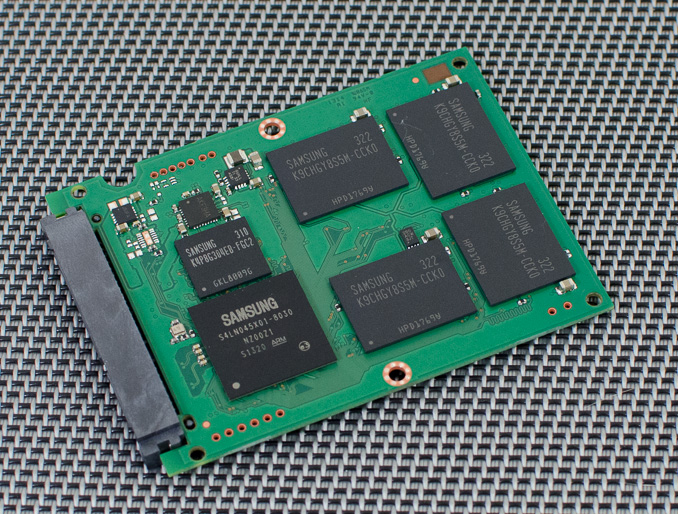Samsung SSD 840 EVO Review: 120GB, 250GB, 500GB, 750GB & 1TB Models Tested
by Anand Lal Shimpi on July 25, 2013 1:53 PM EST- Posted in
- Storage
- SSDs
- Samsung
- TLC
- Samsung SSD 840
Final Words
I was extremely excited about Crucial's M500 because it was the first reasonably priced ~1TB SSD. Even though its performance wasn't class leading, it was honestly good enough to make the recommendation a no-brainer. The inclusion of features like eDrive support were just the icing on the cake. With the EVO, Samsung puts forth a formidable competitor to the M500. It's faster, uses less power at idle and carries lower MSRPs for most of the capacity range. Microsoft's eDrive standard isn't supported at launch, but Samsung expects to change that via a firmware update this September.
Endurance isn't a concern with TLC for client workloads, although I wouldn't recommend deploying the EVO in a write heavy database server or anything like that.
The additional features that Samsung threw in the pot this round really show some innovative thinking. TurboWrite does a good job of blurring the lines between MLC and TLC performance, while Samsung's RAPID DRAM cache offers adventurous users a way of getting a taste of high-end PCIe SSD performance out of an affordable TLC SATA drive.
The 1TB version is exciting because it offers a competitive price with the 960GB M500 but with better performance. It's also good to have an alternative there as the 960GB M500 has been supply constrained at times. At first I didn't believe that Samsung's TLC strategy could hold weight against the Intel/Micron approach of aggressively pursuing smaller process nodes with MLC NAND, but the EVO does a lot to change my opinion. I'd have no issues with one of these drives in my system even as primary storage. The performance story is really good (particularly with the larger capacities), performance consistency out of the box is ok (and gets better if you can leave more free space on the drive) and you've got Samsung's firmware expertise supporting you along the way as well.

To say that I really like the EVO is an understatement. If Samsung can keep quantities of the 840 EVO flowing, and keep prices at or below its MSRP, it'll be a real winner and probably my pick for best mainstream SSD.











137 Comments
View All Comments
halbhh2 - Saturday, July 27, 2013 - link
Exactly. I found that even moving up from 8GB to 16GB had a great effect for me with an old Samsung F3 hard drive. The difference: after just 30 minutes from boot, loading an often used program like iTunes (for podcasts) was very similar to the speed on my laptop which has an 830 SSD and only 4GB. Both load in about 4 seconds, and the 16GB desktop loads so fast because it has had time to cache a lot of iTunes. Before the ram upgrade, that load time for iTunes on the desktop computer was about 14 seconds. Quite a difference due to windows 7 caching. The extra improvement I'd get from installing an SSD onto the desktop computer now would be modest, since I usually only need to reboot once or twice in a week. Still, the sweet spot of price/performance for me is approaching, probably around $60-$70, and that won't be long.Klimax - Sunday, July 28, 2013 - link
It's in wrong place. Unlike OS level caching (at least in Windows), which is in cooperation between memory manager, cache manager and file system driver, this is too low in the chain and sees only requests but nothing else and also takes memory from OS and takes too few.Coup27 - Thursday, July 25, 2013 - link
Typo: "although I wouldn't recommend deploying the EVO in a write heavy serve Microsoft's eDrive standard isn't supported at launch"Excellent article. Samsung continue to push SSDs and I'm really excited about RAPID. Is the 840 Pro due for a successor any time soon? I am selling my current ATX Sandy Bridge + 830 and getting a mITX Haswell + (840 Pro?) and want the fastest Samsung consumer SSD available and I'd be gutted to buy an 840 Pro to see it's successor released a few weeks later.
vLsL2VnDmWjoTByaVLxb - Thursday, July 25, 2013 - link
Another typo last page:"Even though its performnace wasn't class leading, it was honestly good enough to make the recommendation a no-brainer. "
JDG1980 - Thursday, July 25, 2013 - link
Will there be an 840 EVO Pro coming out later? To me, TLC is still a deal-breaker.By the way, what happens if power goes out during a TurboWrite (before the data has been written to the normal storage space)? Does this result in data loss, or, worse, bricking? I'd suspect Samsung at least avoided the latter, but I'd like to see some confirmation on this.
sherlockwing - Thursday, July 25, 2013 - link
I guess you didn't read the Endurance part of the review? Even if you write 100GiB a day all of those drives last longer than their warranty( 3 years), that's more than enough endurance.Coup27 - Thursday, July 25, 2013 - link
Some people just don't want to accept the facts. TLC could get to 99.9% of MLC endurance and people would still want MLC. I've been deploying 840's in a light duty enterprise environment and they've been fine. The only reason I use MLC at home is because I want the absolute fastest performance and I can afford it, not that I actually need it.Oxford Guy - Thursday, July 25, 2013 - link
The SanDisk Extreme 240 was just on sale for $150. TLC NAND still seems like a solution in need of a problem.Spunjji - Friday, July 26, 2013 - link
You can approach TLC pricing with an MLC drive in a sale, but the fact remains that when it comes to actual sustainable production pricing TLC NAND has a 50% density (and thus manufacturing cost advantage) over MLC. Given that NAND price determines drive cost and drive costs are the primary barrier of entry to SSDs, I'm fairly sure it has a problem to solve.FWIW I have not seen any drive touch the 120GB 840's price here in the UK, on sale or otherwise.
Oxford Guy - Friday, July 26, 2013 - link
However, there is also the problem of increasing latency and lifespan from node shrinkage.